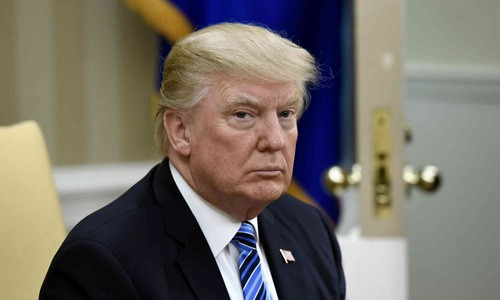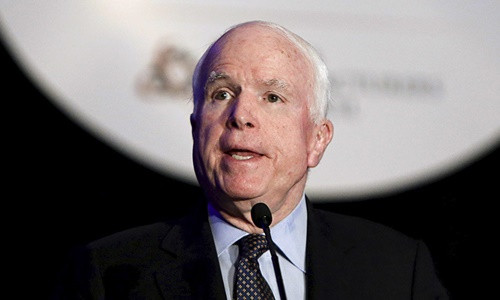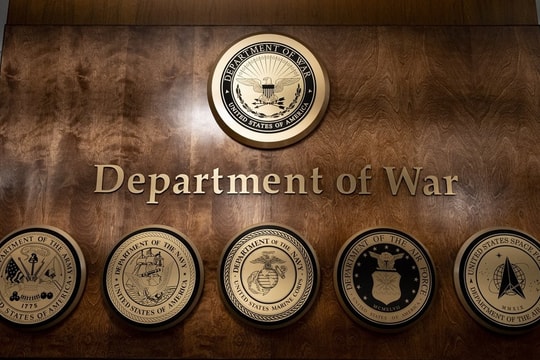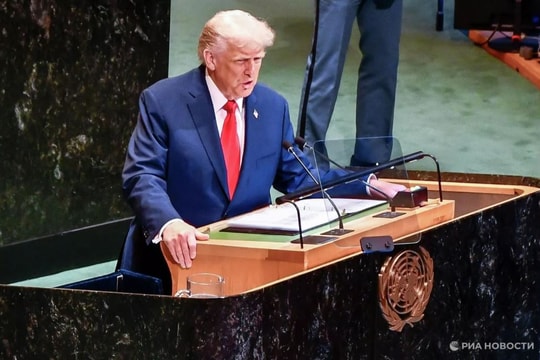Trump's hands tied on national security
The US Congress is showing it wants to restrain Mr. Trump's power on national security issues, big and small.
 |
US President Donald Trump. Photo: ABC News. |
From Russia to the Pentagon budget, Republicans in Congress are proposing new measures to rein in the White House's power and, at times, simply ignoring the wishes of the Trump administration on national security and foreign policy, according to CNN.
Despite Mr Trump’s positive comments about Russia, the US Senate recently passed a series of additional sanctions against Moscow. Any decision by the Trump administration to lift sanctions on Russia must be approved by Congress.
Congressional committees also approved three defense budget packages that are $30 billion larger than the Trump administration's proposal after Republicans complained that the budget proposal from the US president did not go far enough to rebuild the military as he promised.
More surprisingly, last week, the US House Appropriations Committee voted to revoke the Authorization for Use of Force, which is the legal basis for US military intervention in the wars in Iraq, Syria and Afghanistan.
According to national security analyst Mieke Eoyang, it is clear that the Trump administration's leadership is in doubt. "That is why Congress is taking a more active role in national security for the first time in a long time," he emphasized.
Legislative vs. Executive
Congress certainly cannot strip the president of all his powers. Some experts say most of the recent steps are largely symbolic.
"I'm cautiously optimistic that Congress is seeking to confirm some issues amid the messy national security process, but right now it doesn't strike me as a significant test," said Loren DeJonge Schulman, a defense analyst at the Center for a New American Security. "I think they want to test the administration by withholding funding for government proposals or delaying war spending until there's a clear strategy."
In fact, such efforts to obstruct the process occurred under US President Barack Obama when he wanted to close the prison at Guantanamo Bay, Cuba, and withdraw the supervisory authority of US agencies.
Early in the Trump administration, congressional Republicans hoped that the national security team, including Defense Secretary James Mattis, national security adviser HR McMaster and National Intelligence Director Dan Coats, could help steer Mr. Trump in the right direction.
The US president was praised for his decision to launch Tomahawk cruise missiles at a Syrian military base in April after accusing the government of Syrian President Bashar al-Assad of a chemical attack on the town of Khan Sheikhoun that killed more than 80 people.
But in many cases, Trump bypassed his national security team, and his statements and decisions to act or not act have sparked strong voices of opposition on Capitol Hill.
"We are seeing growing skepticism in Congress, particularly from members of the President's own party, about Mr. Trump's ability and willingness to handle important, complex national security issues and his responsibilities as commander in chief," said John Kirby, a former spokesman for the Pentagon and the US State Department.
The Senate’s Russia sanctions bill is by far the most significant fight over national security powers. The bill, which passed 98-2, would allow Congress to block Mr. Trump from rolling back sanctions imposed on Moscow. US senators are pressing the House to pass the bill without weakening it.
In other cases, the US Congress has made symbolic moves to show opposition to Mr. Trump.
For example, the US Senate passed a constitutional amendment reaffirming support for Article 5 of the North Atlantic Treaty Organization (NATO), which stipulates that an attack on one member is an attack on all. This was in response to the US president’s May speech at NATO headquarters, which he did not emphasize at the time.
 |
Senator John McCain. Photo: Reuters. |
Key Republican senators are also directly involved in foreign policy decisions. After Mr. Trump chose to side with Saudi Arabia in isolating Qatar last month, Senate Foreign Relations Committee Chairman Bob Corker spoke out.
The Tennessee Republican congressman said he would use his authority to block the US from selling weapons to any country involved in the Middle East crisis until a reasonable solution to the problem emerges.
Senate Armed Services Committee Chairman John McCain has criticized the administration for failing to articulate a clear strategy in Afghanistan, where 8,400 US troops are stationed. McCain warned last month that he would come up with his own solution.
"The president has two choices: Either announce a strategy or we will turn a strategy that we develop into a defense bill," McCain asserted.
According to VNE
| RELATED NEWS |
|---|








